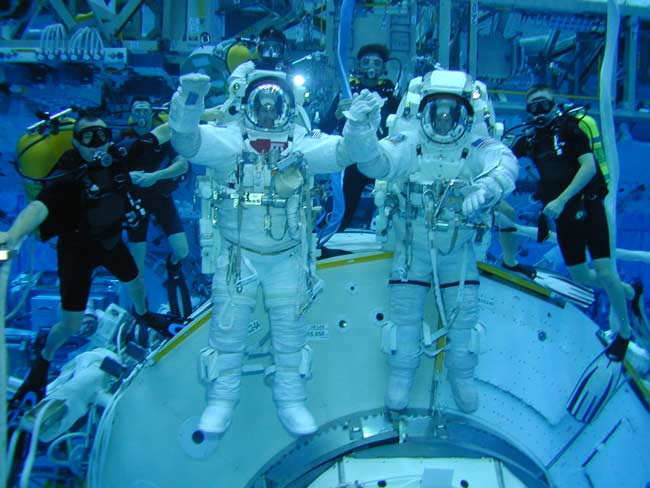Europe Launches Call for New Astronauts

Breaking space news, the latest updates on rocket launches, skywatching events and more!
You are now subscribed
Your newsletter sign-up was successful
Want to add more newsletters?

Delivered daily
Daily Newsletter
Breaking space news, the latest updates on rocket launches, skywatching events and more!

Once a month
Watch This Space
Sign up to our monthly entertainment newsletter to keep up with all our coverage of the latest sci-fi and space movies, tv shows, games and books.

Once a week
Night Sky This Week
Discover this week's must-see night sky events, moon phases, and stunning astrophotos. Sign up for our skywatching newsletter and explore the universe with us!

Twice a month
Strange New Words
Space.com's Sci-Fi Reader's Club. Read a sci-fi short story every month and join a virtual community of fellow science fiction fans!
Europe has put out the call for newastronauts, signaling expectations for future manned missions to the InternationalSpace Station, the moon and more distant destinations.
TheEuropean Space Agency's (ESA) selection process begins on May 19, withcandidates welcome from the agency?s 17 member nations.
?We want tofind high-caliber men and women in Europe to prepare to meet the challenges of ISS exploitation and humanexploration of our solar system in the 21st century," said Michel Tognini,former astronaut and chief of the European Astronaut Centre. "As of May2008, ESA will be searching in each of its 17 member states for the bestcandidates to make this vision a reality."
ESA's astronautrecruitment drive appears to anticipate a new wave of European humanspaceflight missions - although NASA's space shuttle fleet will retire in 2010,leavinga gap between then and the first launch of its capsule-based Orion successorin 2014. That leaves the Russian Soyuz spacecraft and perhaps private companiesto provide space access for the duration.
The agencybuilt the space station?s European Columbus laboratory, which astronautsdelivered in February, and successfullydelivered Jules Verne — the first of at least five Automated TransferVehicle (ATV) cargo ships — on April 3.
Thedouble-decker bus-sized ATV space freighters will haulfresh supplies to the ISS for ESA, the U.S.and other station partners in return for European astronaut slots on future long-durationcrews. A similar ESA astronaut hunt in 1992 stemmed from the agency?s Columbus laboratory project, the agencysaid.
Astronaut applicantswill have to provide the same medical examination certificates as privatepilots, as well as undergo psychological and professional aptitude evaluation,medical evaluation, and a formal interview process before an ESA selectionboard. Final appointments will receive their official announcement in 2009.
Breaking space news, the latest updates on rocket launches, skywatching events and more!
GerhardThiele, head of ESA?s Astronaut Division and a former spaceflyer, saidprospective candidates should be competent in a science discipline, such as life sciences, physics, chemistryand medicine. Engineers or pilots are also welcome to apply, he added.
"Inaddition, characteristics expected of all applicants include a good memory andreasoning ability, concentration, aptitude for spatial orientation, and manualdexterity," Thiele added.
ESA alsowants applicants fluent in English, although Russian-language skills are aplus.
Interested Europeanapplicants can check theagency?s Web site starting May 19, on the first step in the formalapplication. U.S. citizens who want to try for NASA's 2009astronaut class still have until July 1 to apply.
ESA?smember states include Austria, Belgium, Denmark, Finland, France, Germany, Greece, Ireland, Italy, Luxembourg, the Netherlands, Norway, Portugal, Spain, Sweden, Switzerland and the United Kingdom.
- VIDEO: Orbital Arrival: Europe's Jules Verne ATV Arrives at ISS
- VIDEO: ESA's New Science Laboratory
- VIDEO: Part 1: Europe's First ISS Cargo Ship, Part 2

Space.com is the premier source of space exploration, innovation and astronomy news, chronicling (and celebrating) humanity's ongoing expansion across the final frontier. Originally founded in 1999, Space.com is, and always has been, the passion of writers and editors who are space fans and also trained journalists. Our current news team consists of Editor-in-Chief Tariq Malik; Editor Hanneke Weitering, Senior Space Writer Mike Wall; Senior Writer Meghan Bartels; Senior Writer Chelsea Gohd, Senior Writer Tereza Pultarova and Staff Writer Alexander Cox, focusing on e-commerce. Senior Producer Steve Spaleta oversees our space videos, with Diana Whitcroft as our Social Media Editor.
